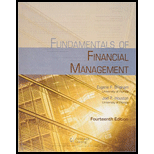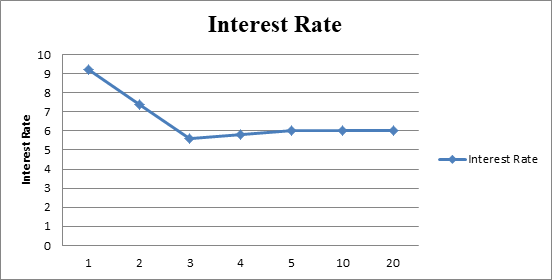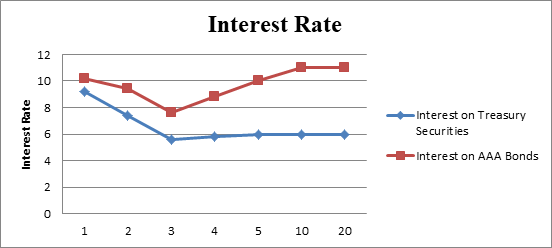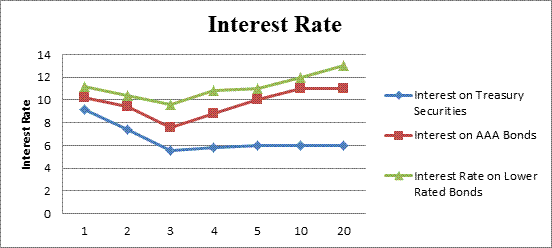
Concept explainers
a.
To identify: The interest on Treasury securities, and yield curve.
Yield:
Yield is the percentage of securities at which the return is provided by the company to its investors. Yield can be there in the form of dividend and interest.
Yield Curve:
The graphical representation of the expected return, provided by the company to its investors during the years is known as the yield curve.
a.
Answer to Problem 18P
The items required for the calculation of interest rate are the real risk-free rate, inflation rate, and maturity risk premium.
Explanation of Solution
Given,
The risk free rate is 2% or 0.02.
Inflation rate for the first year is 7% or 0.07.
The inflation rate of second year is 5% or 0.05.
The inflation rate after two years is 3% or 0.03.
The maturity risk premium for the first year is 0.2% or 0.002 and it will increase by 0.2% every year till 1%.
Formula to calculate the interest rate,
Where,
- r is the corporate bond yield.
- r* is the risk free rate.
- IP is the inflation premium.
- MRP is the maturity risk premium.
Statement to show the calculation of interest rate
| Maturity |
Real Risk-Free Rate (%) (r*) |
Inflation Rate (%) (IP) |
Maturity Risk Premium (MRP) |
Interest Rate on Treasury Bond
|
| 1 | 2 | 7 | 0.2 | 9.20 |
| 2 | 2 | 5 | 0.4 | 7.40 |
| 3 | 2 | 3 | 0.6 | 5.60 |
| 4 | 2 | 3 | 0.8 | 5.80 |
| 5 | 2 | 3 | 1 | 6 |
| 10 | 2 | 3 | 1 | 6 |
| 20 | 2 | 3 | 1 | 6 |
Table (1)
The yield curve of the given data

Fig 1
- The x-axis represents the maturity.
- The y-axis represents the interest rate.
- The interest rates with their respective time period can be shown from the graph.
Hence, the interest of 1-year treasury securities is 9.20%, at 2-year treasury securities is 7.60%, 3-year treasury securities is 5.60%, 4-year treasury securities is 5.80% and thereafter is 6%.
b.
To identify: The interest rate on AAA rated securities, and the yield curve.
b.
Answer to Problem 18P
The items required for the calculation of interest rate are real risk-free rate, inflation rate, and maturity risk premium.
Explanation of Solution
Explanation:
Given,
The risk free rate is 2% or 0.02.
Inflation rate for the first year is 7% or 0.07.
The inflation rate of second year is 5% or 0.05.
The inflation rate after two years is 3% or 0.03.
The maturity risk premium for the first year is 0.2% or 0.002 and it will increase by 0.2% every year till 1%.
The default risk premium is 1% which increases
Formula to calculate the interest rate,
Where,
- r is the corporate bond yield.
- r* is the risk free rate.
- IP is the inflation premium.
- MRP is the maturity risk premium.
- DRP is the default risk premium.
Statement to show the calculation of interest rate
| Maturity |
Real Risk-Free Rate (%) (r*) |
Inflation Rate on Treasury Bond (%) (IP) |
Maturity Risk Premium (%) (MRP) |
Interest Rate on Treasury Bond
|
Default Risk Premium (%) (DRP) |
Interest Rate on AAA rated Bonds
|
| 1 | 2 | 7 | 0.2 | 9.20 | 1 | 10.20 |
| 2 | 2 | 5 | 0.4 | 7.40 | 2 | 9.40 |
| 3 | 2 | 3 | 0.6 | 5.60 | 2 | 7.60 |
| 4 | 2 | 3 | 0.8 | 5.80 | 3 | 8.80 |
| 5 | 2 | 3 | 1 | 6 | 4 | 10 |
| 10 | 2 | 3 | 1 | 6 | 5 | 11 |
| 20 | 2 | 3 | 1 | 6 | 5 | 11 |
Table (2)
The yield curve of the given data

Fig 2
- The x-axis represents the maturity.
- The y-axis represents the interest rate.
- The interest rates of treasury securities and AAA bonds with their respective time period can be shown from the graph.
Hence, the interest of 1-year AAA bond is 10.20%, at 2-year AAA bond is 9.40%, 3-year AAA bond is 7.60%, 4-year AAA bond is 8.80% 5-year AAA bond is 10% and thereafter it is 11%.
c.
To identify: The interest rate on lower rated bonds, and the yield curve.
c.
Answer to Problem 18P
The items required for the calculation of interest rate are the inflation rate, real risk-free rate, and maturity risk premium.
Explanation of Solution
Given,
The risk free rate is 2% or 0.02.
Inflation rate for the first year is 7% or 0.07.
The inflation rate of second year is 5% or 0.05.
The inflation rate after two years is 3% or 0.03.
The maturity risk premium for the first year is 0.2% or 0.002 and it will increase by 0.2% every year till 1%.
The default risk premium is 1% which increases
Formula to calculate the interest rate,
Where,
- r is the corporate bond yield.
- r* is the risk free rate.
- IP is the inflation premium.
- MRP is the maturity risk premium.
- DRP is the default risk premium.
Statement to show the calculation of interest rate on AAA rated bonds
| Maturity |
Real Risk-Free Rate (%) (r*) |
Inflation Rate on Treasury Bond (%) (IP) |
Maturity Risk Premium (%) (MRP) |
Default Risk Premium (%) (DRP) |
Interest Rate
|
| 1 | 2 | 7 | 0.2 | 1 | 10.20 |
| 2 | 2 | 5 | 0.4 | 2 | 9.40 |
| 3 | 2 | 3 | 0.6 | 2 | 7.60 |
| 4 | 2 | 3 | 0.8 | 3 | 8.80 |
| 5 | 2 | 3 | 1 | 4 | 10 |
| 10 | 2 | 3 | 1 | 5 | 11 |
| 20 | 2 | 3 | 1 | 5 | 11 |
Table (3)
Statement to show the calculation of interest rate on lower rated bonds
| Maturity |
Real Risk-Free Rate (%) (r*) |
Inflation Rate on Treasury Bond (%) (IP) |
Maturity Risk Premium (%) (MRP) |
Default Risk Premium on Lower rated Bonds (%) (DRP) |
Interest Rate (%)
|
| 1 | 2 | 7 | 0.2 | 2 | 11.2 |
| 2 | 2 | 5 | 0.4 | 3 | 10.40 |
| 3 | 2 | 3 | 0.6 | 4 | 9.60 |
| 4 | 2 | 3 | 0.8 | 5 | 10.80 |
| 5 | 2 | 3 | 1 | 5 | 11 |
| 10 | 2 | 3 | 1 | 6 | 12 |
| 20 | 2 | 3 | 1 | 7 | 13 |
Table (4)
The yield curve of the given data

Fig 2
- The x-axis represents the maturity.
- The y-axis represents the interest rate.
- The interest rates of Treasury securities, AAA bonds and lower rated bonds with their respective time period can be shown from the graph.
Hence, the interest of 1-year lower rated bond is 11.20%, at 2-year lower rated bond is 10.40%, 3-year lower rated bond is 9.60%, 4-year lower rated bond is 10.80% 5-year lower rated bond is 11%, 10-year lower rated bond is 12% and thereafter is 13%.
Want to see more full solutions like this?
Chapter 6 Solutions
Fundamentals Of Financial Management
- Dynamic Energy Wares (DEW) has decided to change the manner in which it distributes its products to large companies. The change in the distribution system comes at a time when DEW’s profits are declining. The declining profits might not be the sole reason for the change, but it appears to be the primary impetus for the decision. It also appears that the new policy requiring DEW’s distributors to increase inventory levels before the end of the fiscal year will artificially inflate DEW’s sales for the current year. However, DEW’s new policy does not require the distributors to pay for any increased inventory until next year (six months), and any unsold inventory can be returned after nine months. So, if the demand for DEW’s products actually is decreasing, the impact will appear on next year’s financial statements. If the financial manager actually intends to artificially inflate DEW’s profits this year, she must realize that such actions eventually will “catch up” with her. Discussion…arrow_forwardwhat is distributors’ meeting?arrow_forwardWhat is ethical dilemma?arrow_forward
- $1.35 Million for the below question is incorrect, Machine A is $1.81 and Machine B is $0.46 Million. The Perez Company has the opportunity to invest in one of two mutually exclusive machines that will produce a product it will need for the foreseeable future. Machine A costs $8 million but realizes after-tax inflows of $4.5 million per year for 4 years. After 4 years, the machine must be replaced. Machine B costs $17 million and realizes after-tax inflows of $4 million per year for 8 years, after which it must be replaced. Assume that machine prices are not expected to rise because inflation will be offset by cheaper components used in the machines. The cost of capital is 13%. Using the replacement chain approach to project analysis, by how much would the value of the company increase if it accepted the better machine? Round your answer to two decimal places. 1.) $1.35 millionarrow_forwardBuggies-Are-Us Steady Freddie, Inc Gang Buster Group g = 0 g = 55% Year 1 $3.51 (i.e., dividends are expected to remain at $3.053.05/share) (for the foreseeable future) Year 2 $4.04 Year 3 $4.63 Year 4 $5.36 Year 5 $6.15 Year 6 and beyond: g = 55%arrow_forwardProject S has a cost of $10,000 and is expected to produce benefits (cash flows) of $3,000 per year for 5 years. Project L costs $25,000 and is expected to produce cash flows of $7,400 per year for 5 years. Calculate the two projects' NPVs, assuming a cost of capital of 12%. Do not round intermediate calculations. Round your answers to the nearest cent. Calculate the two projects' PIs, assuming a cost of capital of 12%. Do not round intermediate calculations. Round your answers to three decimal places. Project L is not 1.07arrow_forward
- Wilbur and Orville are brothers. They're both serious investors, but they have different approaches to valuing stocks. Wilbur, the older brother, likes to use the dividend valuation model. Orville prefers the free cash flow to equity valuation model. As it turns out, right now, both of them are looking at the same stock-Wright First Aerodynmaics, Inc. (WFA). The company has been listed on the NYSE for over 50 years and is widely regarded as a mature, rock-solid, dividend-paying stock. The brothers have gathered the following information about WFA's stock: Current dividend (D) = $2.30/share Current free cash flow (FCF) = $1.5 million Expected growth rate of dividends and cash flows (g) = 5% Required rate of return (r) = 14% Shares outstanding 500,000 shares How would Wilbur and Orville each value this stock?arrow_forwardCompany P/S Multiples Facebook 13.33 Snap 18.22 Twitter 13.27arrow_forwardThe Perez Company has the opportunity to invest in one of two mutually exclusive machines that will produce a product it will need for the foreseeable future. Machine A costs $8 million but realizes after-tax inflows of $4.5 million per year for 4 years. After 4 years, the machine must be replaced. Machine B costs $17 million and realizes after-tax inflows of $4 million per year for 8 years, after which it must be replaced. Assume that machine prices are not expected to rise because inflation will be offset by cheaper components used in the machines. The cost of capital is 13%. Using the replacement chain approach to project analysis, by how much would the value of the company increase if it accepted the better machine? Round your answer to two decimal places. 1.) $ millionarrow_forward
- Wilbur and Orville are brothers. They're both serious investors, but they have different approaches to valuing stocks. Wilbur, the older brother, likes to use the dividend valuation model. Orville prefers the free cash flow to equity valuation model. As it turns out, right now, both of them are looking at the same stock-Wright First Aerodynmaics, Inc. (WFA). The company has been listed on the NYSE for over 50 years and is widely regarded as a mature, rock-solid, dividend-paying stock. The brothers have gathered the following information about WFA's stock: Current dividend (D) = $3.30/share Current free cash flow (FCF) = $1.5 million Expected growth rate of dividends and cash flows (g)=8% Required rate of return (r) = 13% Shares outstanding 500,000 shares How would Wilbur and Orville each value this stock? The stock price from Wilbur's valuation is $ (Round to the nearest cent.)arrow_forwardThe Perez Company has the opportunity to invest in one of two mutually exclusive machines that will produce a product it will need for the foreseeable future. Machine A costs $8 million but realizes after-tax inflows of $4.5 million per year for 4 years. After 4 years, the machine must be replaced. Machine B costs $17 million and realizes after-tax inflows of $4 million per year for 8 years, after which it must be replaced. Assume that machine prices are not expected to rise because inflation will be offset by cheaper components used in the machines. The cost of capital is 13%. Using the replacement chain approach to project analysis, by how much would the value of the company increase if it accepted the better machine? Round your answer to two decimal places. 1.) $ million What is the equivalent annual annuity for each machine? Do not round intermediate calculations. Round your answers to two decimal places. 2.) Machine A: $ million 3.) Machine B: $ millionarrow_forwardYou expect to have $29,865. You plan to make X savings contribution of $1,690 per month. The expected return is 0.92 percent per month and the first regular savings contribution will be made later today. What is X? Round to 2 decimal places.arrow_forward
 EBK CONTEMPORARY FINANCIAL MANAGEMENTFinanceISBN:9781337514835Author:MOYERPublisher:CENGAGE LEARNING - CONSIGNMENT
EBK CONTEMPORARY FINANCIAL MANAGEMENTFinanceISBN:9781337514835Author:MOYERPublisher:CENGAGE LEARNING - CONSIGNMENT Intermediate Financial Management (MindTap Course...FinanceISBN:9781337395083Author:Eugene F. Brigham, Phillip R. DavesPublisher:Cengage Learning
Intermediate Financial Management (MindTap Course...FinanceISBN:9781337395083Author:Eugene F. Brigham, Phillip R. DavesPublisher:Cengage Learning

